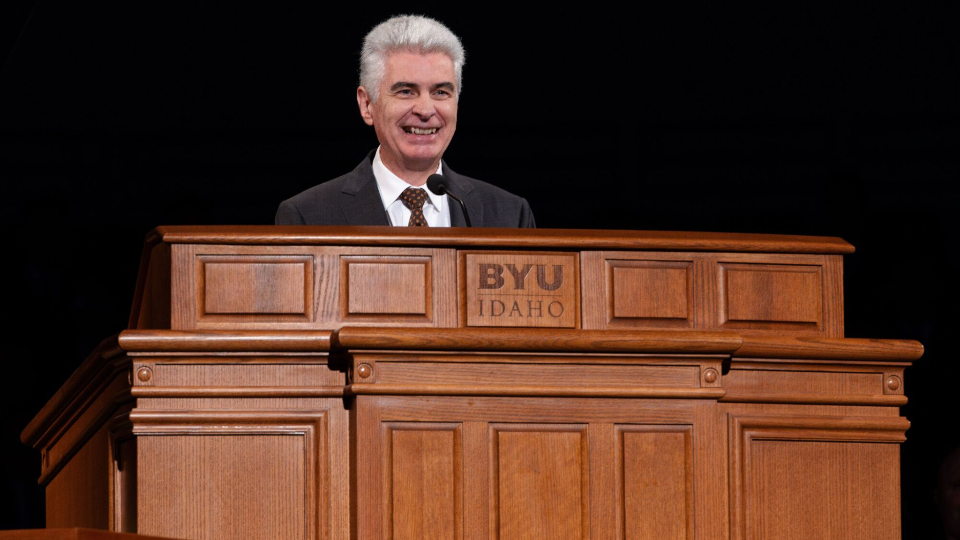
Causse-BYU-I
Presiding Bishop Gérald Caussé speaks during a BYU–Idaho devotional held in the I-Center in Rexburg, Idaho, on Tuesday, November 28, 2023. Photo courtesy of BYU–Idaho.All rights reserved.This story appears here courtesy of TheChurchNews.com. It is not for use by other media.
By Rachel Sterzer Gibson, Church News
Presiding Bishop Gérald Caussé first met his wife, Sister Valérie Caussé, 39 years ago in a young single adult ward in Paris, France.
At the time, he was “kind of a nerd,” he said, who spent most of his time in books and a large portion of his free time serving as the ward clerk. She, however, would peek her head behind the door of the clerk’s office to flash a smile and say hello.
They started dating and were married two years later. Some time after their marriage he asked her how she could have possibly fallen in love with him. Her response, “I saw your potential.”
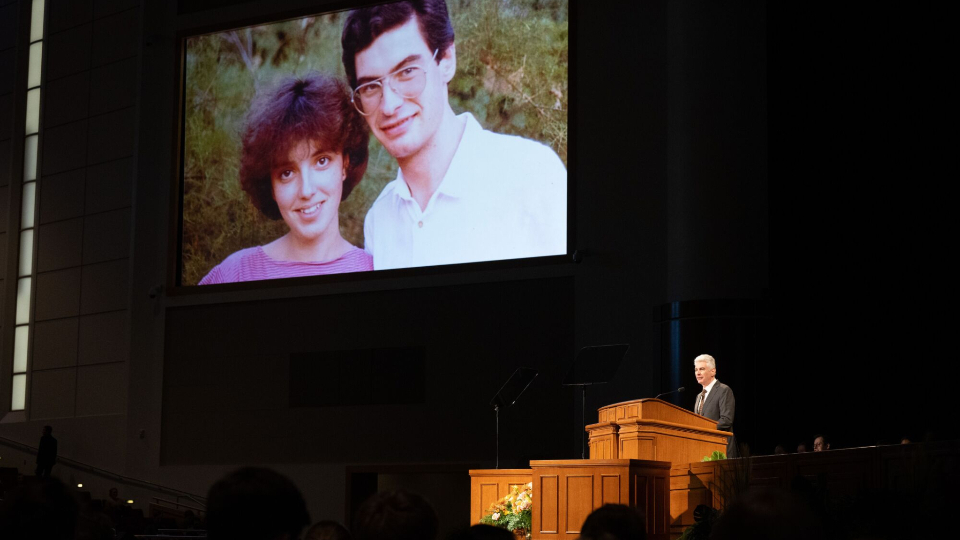
causse-BYU-I
During a BYU–Idaho devotional on Tuesday, November 28, 2023, Presiding Bishop Gérald Caussé shares a photo of him and his wife when they were dating. Photo courtesy of BYU–Idaho.All rights reserved.Speaking during a BYU–Idaho devotional on Tuesday, November 28, Bishop Caussé assured students: “My young friends, the world would be different if we could see others, including ourselves, as we can become rather than merely as we are today. Everything would be changed for the better if we could look upon ourselves and our fellowmen and women with a clear vision of both our earthly and eternal potential.”
Divine Lineage and Destiny
For individuals to understand their potentials, they must understand who they truly are, Bishop Caussé said.
In the first chapter of the Book of Moses, God tells Moses: “Moses, my son; … thou art in the similitude of mine Only Begotten” (verse 6).
By referring to Moses as His “son,” God confirms Moses’ divine lineage, Bishop Caussé said. “Each of us is a son or daughter of God, created by Him in His own image and likeness. Each of us has an inherent, divine nature.”
God also tells Moses he is “in the similitude of [His] Only Begotten.” This statement “confirms each human being’s potential. Because we are God’s children, we have the innate capacity to become exalted, just like our Savior, Jesus Christ.”
Latter-day Saints believe, as taught in Gospel Topics: “Just as a child can develop the attributes of his or her parents over time, the divine nature that humans inherit can be developed to become like their Heavenly Father’s.”
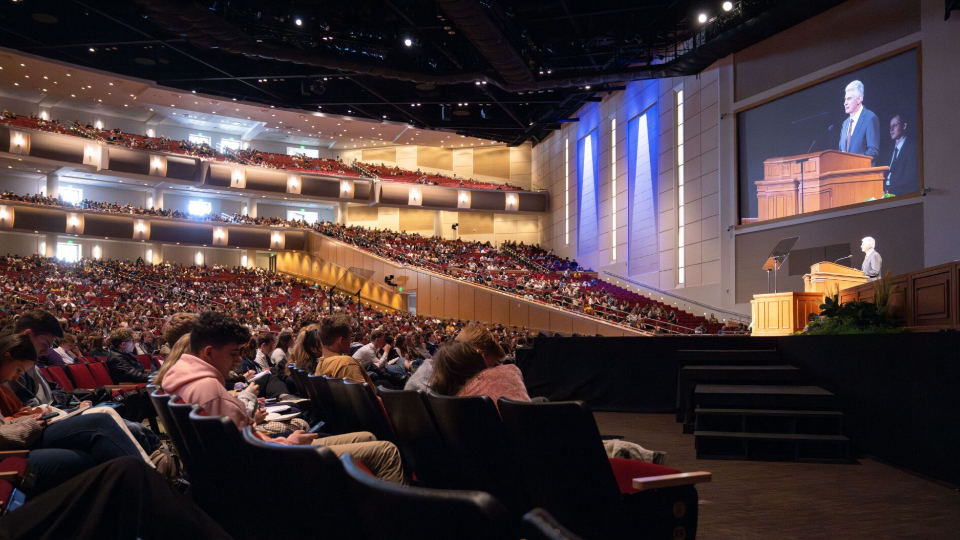
Causse-BYU-I
Presiding Bishop Gérald Caussé speaks during a BYU–Idaho devotional held in the I–Center on the Rexburg, Idaho, campus on Tuesday, November 28, 2023. Photo courtesy of BYU–Idaho.All rights reserved.‘Highest Destination’
During the most recent general conference, President Dallin H. Oaks, First Counselor in the First Presidency, invited listeners to reach for “the highest destination” in the celestial kingdom, or exaltation, which can only be achieved through marriage in the temple (“Kingdoms of Glory,” October 2023 general conference).
Bishop Caussé said he has had the privilege of performing sealings for young couples in the house of the Lord. Often they seem young and inexperienced. “However, as the wonderful words of the sealing ordinance are spoken, I suddenly see them in a different light. A glorious vision unfolds, filled with marvelous promises,” he said.
This transformation happens through ongoing progression and experience but it begins “right there, in the temple’s sealing room,” with a couple still imperfect in their accomplishments.
“My brothers and sisters, a successful eternal marriage requires tremendous faith,” Bishop Caussé said. “Faith in your own potential; faith in your spouse’s potential; faith in the institution of marriage and in the eternal marriage covenant; and, most of all, faith in our Heavenly Father and in the atoning power of our Savior, Jesus Christ.”
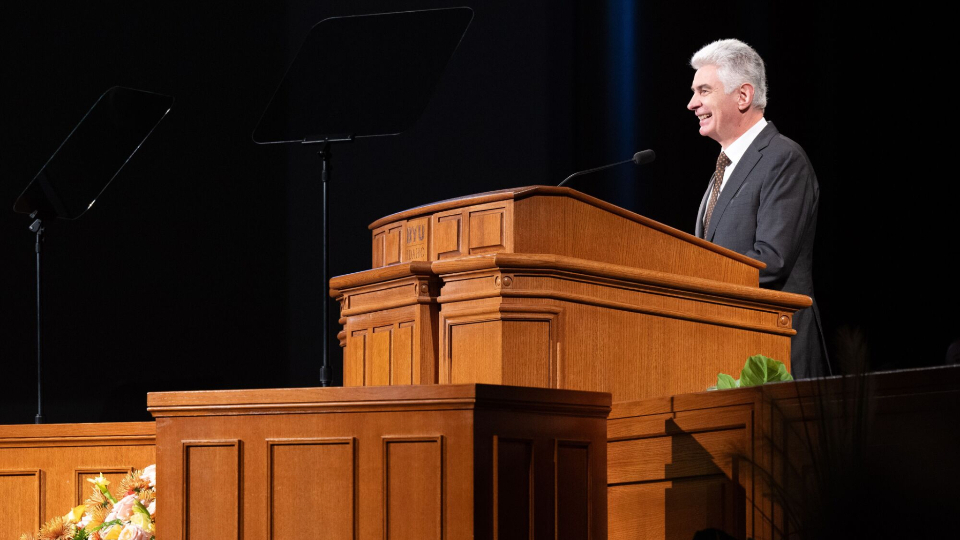
Causse-BYU-I
Presiding Bishop Gérald Caussé speaks during a BYU–Idaho devotional held in the I–Center on the Rexburg, Idaho, campus on Tuesday, November 28, 2023. Photo courtesy of BYU–Idaho.All rights reserved.‘The Indispensable Power of Christ’s Atonement’
Those who rely only on their own talents and personal efforts will not have the capacity to progress and won’t be able to achieve their eternal goals, Bishop Caussé taught. “However, when we rely upon the Lord and His Atonement, our potential for progression knows no limits.”
Bishop Caussé testified that the power of the Savior’s Atonement is real. “It changes the way we see ourselves; it brings comfort; it increases our self-confidence; it gives you the strength to change your life and progress towards your eternal destiny.”
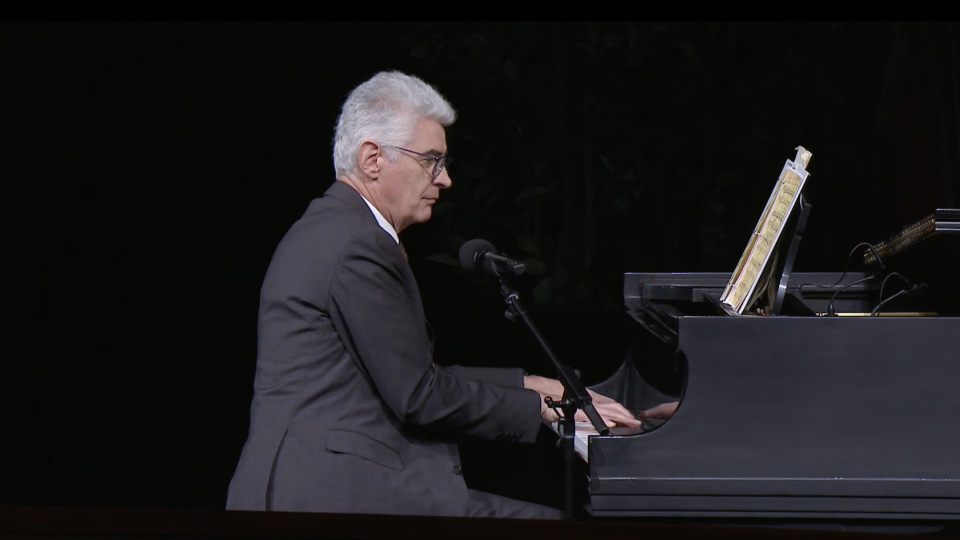
Causee-BYU-I
Presiding Bishop Gérald Caussé plays the piano as part of his BYU–Idaho devotional presentation on Tuesday, November 28, 2023, in the I-Center in Rexburg, Idaho. Photo is a screenshot courtesy of byui.edu.All rights reserved.‘Finding the Mozarts’
The French author, pilot and news reporter Antoine de Saint Exupéry, who died in 1944, once wrote of seeing a destitute, hopeless young Polish refugee on a train. “This is the child Mozart, here is a life full of sweet promises,” Antoine thought. However, he sadly concluded, “This Mozart is condemned.”
When he was 14 years old, Bishop Caussé said, he had a piano teacher who gave him a piece of music to learn that seemed “totally out of my reach.” However, his teacher shared that she knew he had the potential to play it beautifully.
Sitting at a grand piano, Bishop Caussé then played an excerpt of that piece for those gathered in the BYU–I Center.
Afterward, he invited students “to seek inspiration to find the Mozarts among us. In a way, each of us is a Mozart in the making. We all have talents, gifts and abilities that ask for nothing more than the opportunity to blossom and thrive. Believing in others, helping them discover their potential and loving them wholeheartedly: This is what should inspire us in our interactions with our fellow sojourners on this earth,” he declared.
Copyright 2023 Deseret News Publishing Company.